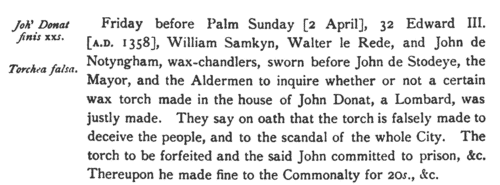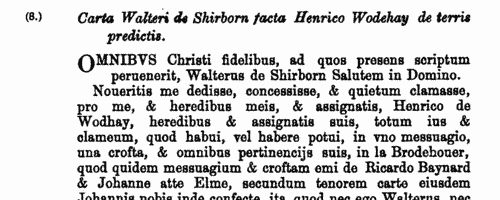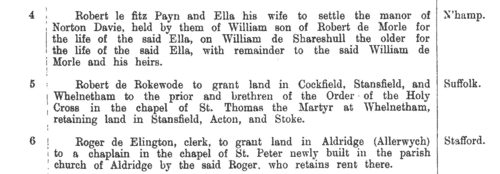Bedeford Surname Ancestry ResultsOur indexes 1000-1999 include entries for the spelling 'bedeford'. In the period you have requested, we have the following 53 records (displaying 41 to 50): Single Surname Subscription | | | Buying all 53 results of this search individually would cost £234.00. But you can have free access to all 53 records for a year, to view, to save and print, for £100. Save £134.00. More... |
These sample scans are from the original record. You will get scans of the full pages or articles where the surname you searched for has been found. Your web browser may prevent the sample windows from opening; in this case please change your browser settings to allow pop-up windows from this site. Inhabitants of London
(1352-1374)
Letter Book G of the City of London contains enrolments of recognizances between inhabitants, particularly citizens, for sums of money lent or due; grants of pieces of land or property; and various records relating to the city administration.
BEDEFORD. Cost: £4.00.  | Sample scan, click to enlarge

| London, Essex and Hertfordshire clerks, clerics, monks and clergy
(1361-1374)
Ordinations to first tonsure, acolytes, subdeacons, deacons and priests, from the register of bishop Simon de Sudbury of London. London diocese covered Middlesex, Essex and part of Hertfordshire; the ordinations also attracted many persons from distant dioceses bearing letters dimissory from their ordinaries, and these are duly noted in the text. Many of these clerks would not go on to obtain benefices and remain celibate. The lists of subdeacons, deacons and priests state the clerks' respective titles, i. e., give the names of the person or religious house undertaking to support them. Monks and friars ('religious') are listed separately, and the lists of subdeacons, deacons and priests are also separated into beneficed and not beneficed (or 'not promoted'). The acolyte lists are unusual in giving a parish or diocese of origin.BEDEFORD. Cost: £6.00.  | Sample scan, click to enlarge

| Fine Rolls
(1369-1377)
The fine rolls of the 43rd to 51st years of the reign of king Edward III record part of the government administration in England, with orders sent out day by day to individual officers, and commitment of particular responsibilities and duties. There is also some material relating to Wales, Scotland, Ireland and the English possessions in France. BEDEFORD. Cost: £4.00.  | Sample scan, click to enlarge

| Fine Rolls
(1377-1383)
The fine rolls of the 1st to 6th years of the reign of king Richard II record part of the government administration in England, with orders sent out day by day to individual officers, and commitment of particular responsibilities and duties. There is also some material relating to Wales, Scotland, Ireland and the English possessions in France. BEDEFORD. Cost: £4.00.  | Sample scan, click to enlarge

| Inhabitants of Cambridge
(1298-1389)
'Cambridge Gild Records' was edited by Mary Bateson for the Cambridge Antiquarian Society, and printed in 1903. Several important records for the town are brought together: minutes of the Gild of St Mary in the church of St Mary in the Market Place, 1298-1319 (pages 1-13); bede rolls of the same of around 1349 (14-25); minutes of the Gild of Corpus Christi in the church of St Bene't (26-62); returns for all the Cambridge gilds in 1389 (63-128); a calendar of deeds connected with the gilds of St Mary and Corpus Christi (129-150); and also a subsidy roll for the borough, listing householders in the 8th year of king Edward II (1314-1315) (151-157). The gild minutes include lists of persons entering the gild, usually paying a certain amount for alms and for wax for lights (candles). The bede rolls list prayers for the souls of the deceased, using the formula 'pro anima ..... (et ..... uxoris ejus)', 'for the soul of ..... (and of ..... his wife)'. Dates are not generally given, but most of the entries in these bede rolls are from 1349 to 1352. BEDEFORD. Cost: £4.00.  | Sample scan, click to enlarge

| Inhabitants of London
(1375-1399)
Letter Book H of the City of London contains enrolments of recognizances between inhabitants, particularly citizens, for sums of money lent or due; grants of pieces of land or property; and various records relating to the city administration.
BEDEFORD. Cost: £4.00.  | Sample scan, click to enlarge

| Grantees of offices, commissions and pardons
(1413-1416)
The Patent Rolls are the Chancery enrolments of royal letters patent. Those for the 1st, 2nd and 3rd years of the reign of king Henry V (21 March 1413 to 20 March 1416) were edited for the Public Record Office by R. C. Fowler, and published in 1910. The main contents are royal commissions and grants; ratifications of ecclesiastical estates; writs of aid to royal servants and purveyors; and pardons. The commissions of the peace issued for the English towns and counties and entered on the rolls, being largely repetitive, have been consolidated in a single appendix.BEDEFORD. Cost: £2.00.  | Sample scan, click to enlarge

| Clerks, clergy, benefactors and tenants of the Hospital of St Nicholas, Salisbury
(1214-1439)
Christopher Wordsworth, Master of the Hospital of St Nicholas in Salisbury, Wiltshire, published an edition of the 15th-century cartulary of that foundation in 1902. While transcribing the text, he interspersed it with notes and lists from his own researches so as to provide a general history of the hospital, and some of the material dates from much later than 1500, and relates to those institutions which he regarded as daughter institutions or offshoots of the hospital. There are later additions to the cartulary through to 1639, and records of the Chapel of St John Baptist on the Isle, the Scotist College of St Nicholas de Vaux (Valle Scholarium), and the collegiate church of St Edmund, Salisbury. There is also a calendar of records belonging to the hospital. The cartulary itself is a quarto codex of 80 leaves, copying charters of bequests to the hospital, and in these the main persons to appear are the benefactors, the witnesses, and occasionally the names of tenants, occupiers of adjoining tenements, and members of the hospital clergy. The cartulary is in six geographical sections: I, Box, Wyvelesford and Manningford Bohun; II, Broad Hinton; III, Fyssherton (Fisherton Aucher or Anger); IV, East and West Harnham; V, Salisbury; and VI, Gerardeston (Gurston in Broadchalke).BEDEFORD. Cost: £4.00.  | Sample scan, click to enlarge

| Close Rolls
(1447-1454)
The close rolls of the 26th to 32nd years of the reign of king Henry VI record the main artery of government administration in England, the orders sent out day by day to individual officers, especially sheriffs of shires: they are an exceptionally rich source for so early a period. There is also some material relating to Wales, Scotland, Ireland and the English possessions in France. BEDEFORD. Cost: £4.00.  | Sample scan, click to enlarge

| Landowners and tenants in Middlesex
(1345-1485)
Inquisitions ad quod damnum were held by the appropriate sheriff or escheator (or other officer in whose bailiwick the matter in question might lie) to investigate cases in which the royal or public interest might be damaged by proposed alienation or settlement of land (especially alienation to religious uses, into mortmain). The key findings from these inquisitions were as to the tenure of the land and the service due from it; its yearly value; the lands remaining to the grantor, and whether they sufficed to discharge all duties and customs due from him; and whether he can still be put upon juries, assizes and recognitions, so that the country be not burdened by his withdrawal from them. Generally speaking, this process had the makings of a system of licensing such alienations, and raising money in proportion to the valuations. Equally, there are many items that deal with subjects such as the closing of public roads, the felling or inclosing of woods, or the proposed grant of liberties or immunities. A calendar of these inquisitions from the 19th year of the reign of king Edward III to the 2nd year of Richard III was prepared by the Public Record Office and published in 1906. We have now indexed this calendar by surname and county. Most of the individuals appearing in the calendar are either pious individuals seeking to make grants to religious bodies for the sake of their souls; or landowners securing the disposition and settling of their real estate. But some other names do appear - tenants, trustees, chaplains and clerks.BEDEFORD. Cost: £6.00.  | Sample scan, click to enlarge

|
Research your ancestry, family history, genealogy and one-name study by direct access to original records and archives indexed by surname.
|












